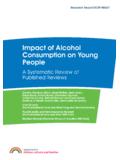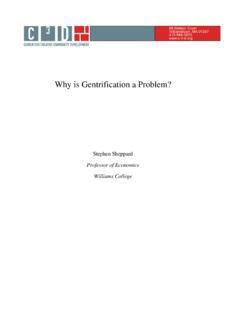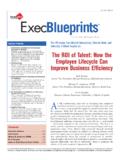Transcription of Why businesses should recruit young people
1 Why businesses should recruit young people Briefing Paper February 2012. Why businesses should recruit young people Chris Hasluck Hasluck Employment Research UK Commission for Employment and Skills February 2012. Views expressed by the author of this Briefing Paper are not necessarily those of the UK Commission for Employment and Skills Table of Contents 1 1. 2 What is the business case for recruiting young people ? .. 2. What are the barriers and misconceptions? .. 2. What can young people bring to a firm? .. 3. 3 Why should businesses offer a young people an apprenticeship or work-based training opportunity?
2 6. 4 Why should employers offer young people work experience opportunities? .. 7. 5 Conclusion .. 9. 1 Introduction The recent recession in the UK has highlighted once more the vulnerability of young people to changes in economic conditions (DWP and HMRC, 2009; OECD, 2010;. European Commission, 2011). Even before the onset of the recession a large number of 16-24 year olds (745,800 in 2005) were not in employment, education or training (NEETs). but this number has risen sharply to ,000 by the third quarter of 2011 (DfE, 2011). The concern is that such high levels of worklessness at an early age can have consequences beyond the short-term.
3 There is a large body of research that indicates the scarring effect of worklessness, the latest being that of Bell and Blanchflower (2010). who found evidence not only of the economic costs of youth unemployment in terms of lower lifetime earnings but also costs in terms of job satisfaction, happiness and health. Clearly what young people not wishing to remain in full-time education need is a route to sustainable employment. Yet, remarkably, relatively few employers recruit young people . The National Employers Skills Survey 2009 (NESS2009) found that less than a quarter of employers (23 per cent) had recruited a 16-23 year old in the 12 months prior to the survey while only 6 per cent had recruited a 16 year old and 11 per cent had recruited a 17-18 year old, directly from school of college (UKCES, 2010).
4 Despite this, employers are not unsympathetic to the need to help young people find employment. Over 90 per cent of members of the Chartered Management Institute agreed that they had a duty to develop the skills of young employees (Woodman and Hutchings, 2011). Nonetheless, most employers feel that they should help young people into work only if there is a clear business case for doing so (Education and Employers Task Force, 2010). This brief paper summarises the business case and the evidence that supports it. 1. 2 What is the business case for recruiting young people ? What are the barriers and misconceptions?
5 There is no denying that some employers have very negative views about hiring young people , questioning their preparedness for work, their basic skills and their attitudes (Wolf, 2011; CBI, 2011; BCC, 2011). One problem with this is that they tend to regard all young people as the same even when this is not the case - and, consequently, are reluctant to recruit anyone from this age group (CBI, 2011; BCC, 2011, Hasluck, 2011). Clearly where there is a basis for such negative perceptions then remedial action is required by schools and colleges and by young people themselves.
6 Nonetheless, not all employers hold such views and young people are not all the same. Often experience of employing young people will change employers' negative views into a more positive perspective (CIPD, 2011). All recruits represent a risk, a potential burden on the business (BCC, 2011) and young people are no different to other recruits in that respect. young people may lack experience, both of specific types of work and of the culture of the workplace, but they have the potential to bring other qualities to a business. Employers seeking to recruit can do so in a number of ways including recruiting a fully experienced/skilled person or recruiting a young person and training them into the job.
7 In the past, and especially during the recession, many employers have opted to place an emphasis on previous experience and this has tended to exclude potential young recruits who could be of benefit to a business (Bell and Blanchflower, 2010). An over-emphasis on recruits with previous experience or higher qualifications than necessary is a reflection of the well documented short-termism found in UK management and recruitment policies (Grinyer, Russell and Collison D (1998); Spielhofer and Sims, 2004; Glick, 2010). That short-termism focuses on recruiting people who are immediately productive rather than who might form the workforce of the future.
8 Where this happens, long-term benefits to a business may be overlooked. The business case for employing a young person is not just about immediate benefits (although there are some) but it is about the return that employers can receive from a longer-term investment in their workforce (Gambin, Hasluck and Hogarth, 2010). This is especially so where young people are recruited to employment that involves a period of training such as an apprenticeship. It is important, therefore, that employers are made aware of the potential benefits to their business of such investments. 2. The business case will vary depending on the circumstances under which the business is operating and not all employers have jobs that are suitable.
9 Nonetheless, the benefit to employers of employing young people has been widely recognised around the world by academics, business leaders and governments alike: see, for instance, NZBCSD (2003), Hogarth, Hasluck and Daniel (2005), Hasluck and Hogarth, 2010, Mann and Glover (2011), CIPD (2011), HRC (2011) and REC (2011). All recognise that many, if not most, employers can gain from recruiting and employing young people school leavers and graduates alike by employing a workforce that is better matched to the needs of their business, is flexible and forward looking, and has the potential to provide the skills and the managers it will require in the future.
10 What can young people bring to a firm? Recruiting and employing young people can generate benefits for a business in both the short-term and the longer-term. Immediate benefits include: Lower recruitment costs (CBI, 2007: Education and Employers Task Force, 2010). young people in school and college will be actively seeking employment and many apply speculatively to employers reducing the costs of advertising (Hasluck, 2011). Engaging with schools and colleges can also help with the selection of good quality recruits while a reputation for offering jobs to young people (especially if that reputation is associated with good training opportunities) will encourage other young people to apply, thus widening the pool of applicants from which the business can draw (Mann and Glover, 2011a and 2011b).

















